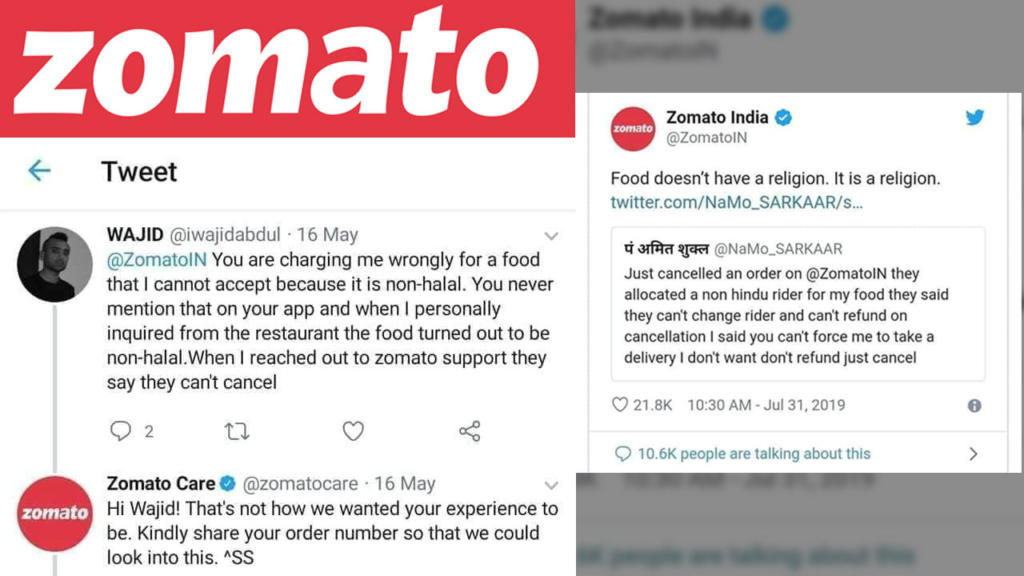Yesterday, Twitter became a virtual battlefield for another controversy. Zomato was at the centre of this controversy. One of the users of the Food Delivery app had cancelled an order as the delivery boy was a non Hindu. After cancelling his order, he tweeted about it and also said that he did not even insist for a refund and he could not be forced to take a delivery.
Quoting the user’s tweet, Zomato stated, “Food doesn’t have a religion. It is a religion.” With this Zomato launched a “Food does not have a religion” campaign. Zomato Founder also jumped into this controversy and tweeted, “We are proud of the idea of India – and the diversity of our esteemed customers and partners. We aren’t sorry to lose any business that comes in the way of our values.”
We are proud of the idea of India – and the diversity of our esteemed customers and partners. We aren’t sorry to lose any business that comes in the way of our values. 🇮🇳 https://t.co/cgSIW2ow9B
— Deepinder Goyal (@deepigoyal) July 31, 2019
The argument that “food doesn’t have a religion” obviously does not make such sense. In India, at least, food does have a religion. If we put it in a subtly different way, our eating habits and choice of food is certainly guided by our religious sentiments and personal faith. What we eat is guided by our religious sentiment which essentially ends up giving a religious angle to food as well. The entire controversy over beef, for example, emerges out of religious beliefs. If food didn’t really have a religion, then ideas like Halal would not have been institutionalised. Special menus for Navratra and Ramadan would not have been a part of restaurants. In fact, Zomato, has also emerged as an app through which Navratri food can be ordered. If food does not have a religion, then why does Zomato make a special case for Navratri food?
It did not take long for the social media users to take on Zomato over this controversy. It was soon pointed out that when a user had complained about delivery of non-Halal food, Zomato had acted in a very different way. The user tweeted about the issue and said that he couldn’t accept non-Halal food. He also complained that Zomato never mentions that food is non-Halal on its app and he came to know about it only when he enquired about it from the restaurant. He also mentioned that Zomato support refused to cancel the order. However, Zomato had apologised and promised to look into this issue instead of lecturing the user about atheism of the food that was delivered. This was very much similar to the present case. In cases, the individual faith and religious beliefs of the customer was involved. However, Zomato clearly reacted very differently in both the cases.
Pic 1: Zomato's reply when a customer wants to cancel food because it's non-Halal.
Pic 2: Zomato's reply when a customer wants to cancel food because delivery boy is non-Hindu in shravan month.
Why such double standards @ZomatoIN? pic.twitter.com/4OQg9Ynyqi
— Ankur Singh (Modi Ka Parivar) (@iAnkurSingh) July 31, 2019
In another case which bears striking similarity to the present one, a twitter user complained about a restaurant partner which supplied pork and allegedly gave him wrong information by mistake. Zomato seemed to be in concord with the complainant instead of lecturing him about the “secular character” of food. Zomato had even stated that it was looking into that issue right then.
Mohammed Ashraf ordered Veg Pizza, he got a tasty Veg Pizza. But still he complained because the restaurant also has Pork in its Menu.
Look how politely you replied to this religious complaint.
Only values you have is Money, so stop preaching. https://t.co/v3qapE9GCU pic.twitter.com/qXDkw1xB1B
— Ankur Singh (Modi Ka Parivar) (@iAnkurSingh) August 1, 2019
Interestingly, Zomato has now issued a statement titled, “food, religion and halal” in which it continues to insist that food does not have a religion. Ironically, in the same statement it also mentions how it has special tags for Navratra thalis and Jain food.
https://twitter.com/ZomatoIN/status/1156527900931346432
Giving an explanation about Halal meat, it has stated, “Restaurants (whether a Muslim establishment or otherwise) serving meat specifically obtain halal certification by an all-India body. Again, we play no role in this categorisation as we only seek proof of authenticity when a restaurant claims to serve halal food. FSSAI license is mandatory. Halal certification is voluntary.” It then went on to explain that halal food is specifically mentioned so that users can make an “informed choice.”
